高二英语人教版新课标选修七 Unit 4 Sharing reading:a letter home Language points(25张ppt)
文档属性
| 名称 | 高二英语人教版新课标选修七 Unit 4 Sharing reading:a letter home Language points(25张ppt) |  | |
| 格式 | zip | ||
| 文件大小 | 3.3MB | ||
| 资源类型 | 教案 | ||
| 版本资源 | 人教版(新课程标准) | ||
| 科目 | 英语 | ||
| 更新时间 | 2020-03-26 21:53:43 | ||
图片预览


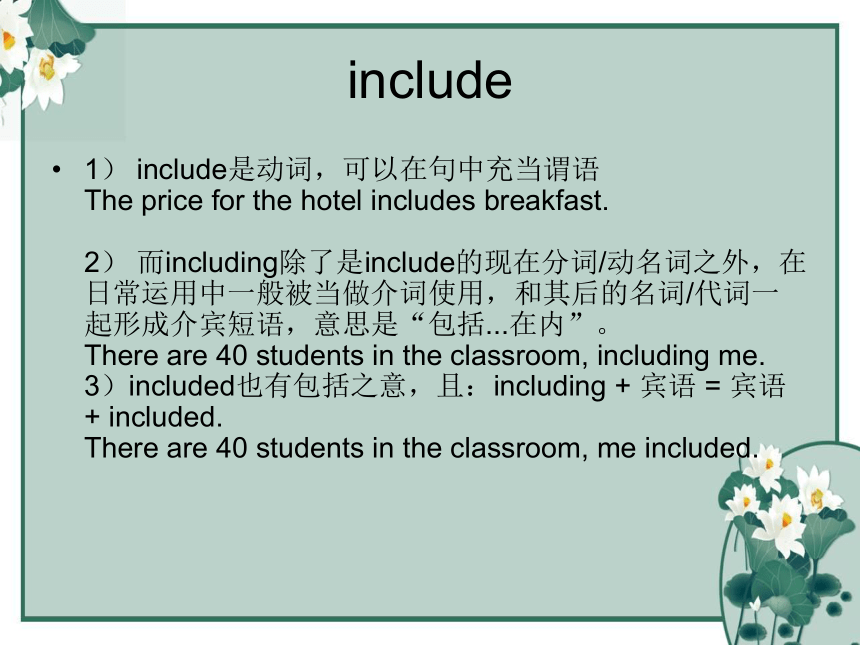
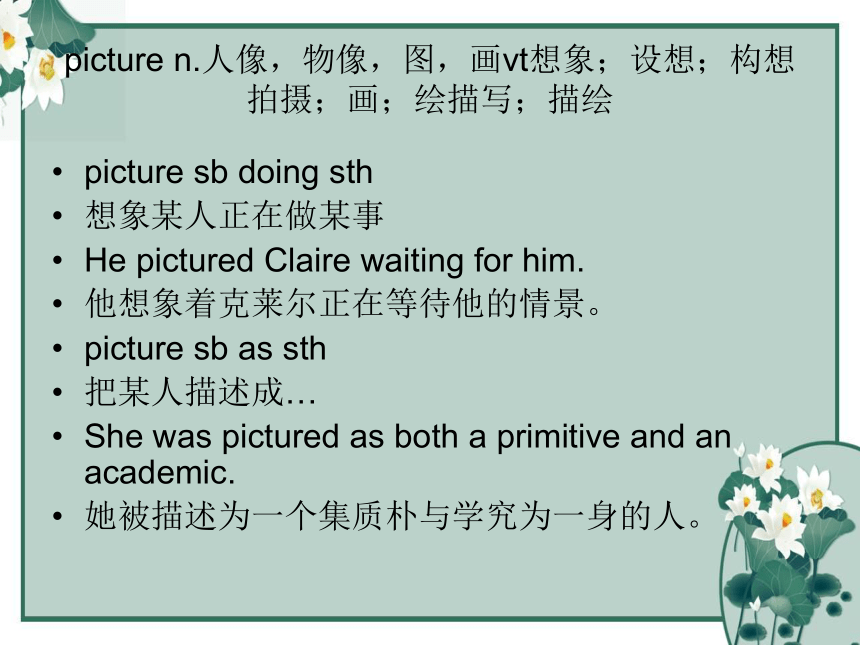
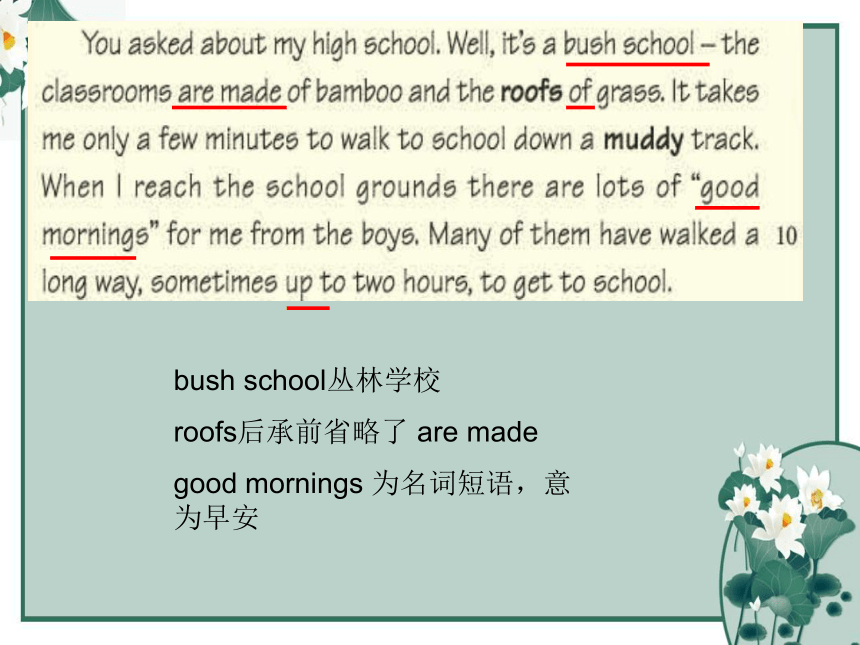
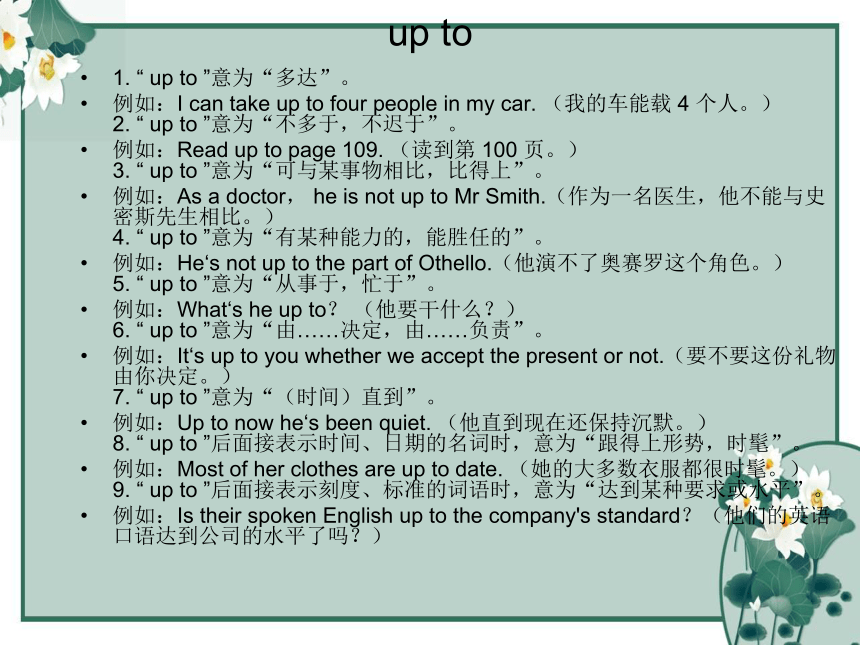
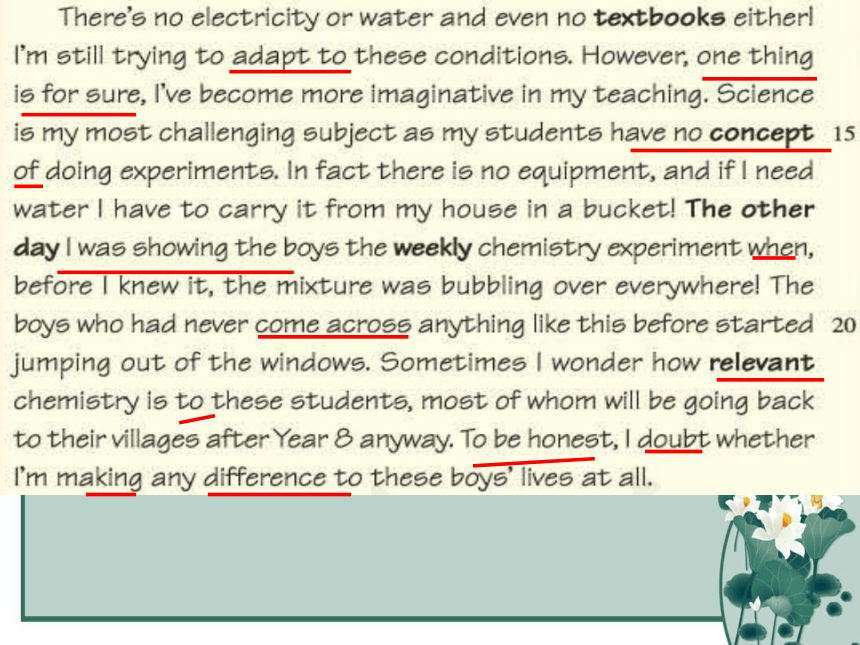

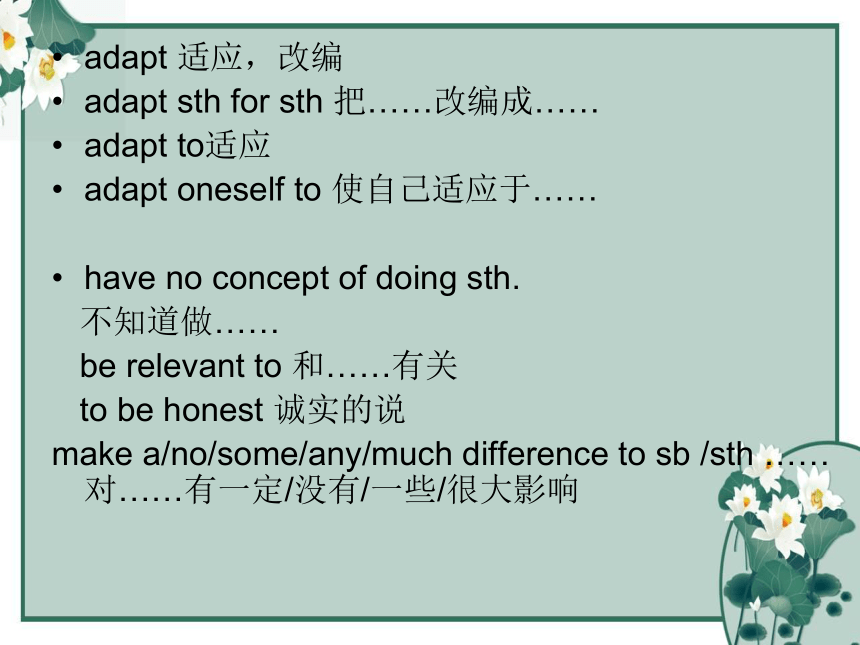
文档简介
(共25张PPT)
BOOK7 Unit 4 Sharing
Reading: A letter home
take当“花费”讲,只用于花费时间,不能用于钱。 常用于:It takes sb. some time to do sth.(花时间做某事)。 hear from sb 收到某人来信 hear of/about听说
be dying to do sth.渴望做某事
be dying for sth渴望某事
include
1) include是动词,可以在句中充当谓语 The price for the hotel includes breakfast. 2) 而including除了是include的现在分词/动名词之外,在日常运用中一般被当做介词使用,和其后的名词/代词一起形成介宾短语,意思是“包括...在内”。 There are 40 students in the classroom, including me. 3)included也有包括之意,且:including + 宾语 = 宾语 + included. There are 40 students in the classroom, me included.
picture n.人像,物像,图,画vt想象;设想;构想拍摄;画;绘描写;描绘
picture sb doing sth
想象某人正在做某事
He pictured Claire waiting for him.
他想象着克莱尔正在等待他的情景。
picture sb as sth
把某人描述成…
She?was pictured as?both a primitive and an academic.
她被描述为一个集质朴与学究为一身的人。
bush school丛林学校
roofs后承前省略了 are made
good mornings 为名词短语,意为早安
up to
1. “ up to ”意为“多达”。
例如:I can take up to four people in my car. (我的车能载 4 个人。) 2. “ up to ”意为“不多于,不迟于”。
例如:Read up to page 109. (读到第 100 页。) 3. “ up to ”意为“可与某事物相比,比得上”。
例如:As a doctor, he is not up to Mr Smith.(作为一名医生,他不能与史密斯先生相比。) 4. “ up to ”意为“有某种能力的,能胜任的”。
例如:He‘s not up to the part of Othello.(他演不了奥赛罗这个角色。) 5. “ up to ”意为“从事于,忙于”。
例如:What‘s he up to? (他要干什么?) 6. “ up to ”意为“由……决定,由……负责”。
例如:It‘s up to you whether we accept the present or not.(要不要这份礼物由你决定。) 7. “ up to ”意为“(时间)直到”。
例如:Up to now he‘s been quiet. (他直到现在还保持沉默。) 8. “ up to ”后面接表示时间、日期的名词时,意为“跟得上形势,时髦”。
例如:Most of her clothes are up to date. (她的大多数衣服都很时髦。) 9. “ up to ”后面接表示刻度、标准的词语时,意为“达到某种要求或水平”。
例如:Is their spoken English up to the company's standard?(他们的英语口语达到公司的水平了吗?)
doubt用法
doubt用作动词
doubt可接名词、代词、动名词、带疑问词的动词不定式或that/wh-/if从句作宾语
Maybe he changed his mind, but I doubt it.
也许他改变了主意,但我表示怀疑。
在疑问句或否定句中, doubt的宾语从句应用that引导; 在肯定句中,则应由if/whether引导。
I doubt whether the new one is better.
I never doubted that she would come.
二.doubt用作名词
doubt后可接介词about/of/ on引起的短语表示“对…怀疑”。
doubt后可接同位语从句。that引导的同位语从句一般用于否定句或疑问句中; whether引导的同位语从句一般用于肯定句中。
Is there any doubt that he is a thief?
他是个贼难道还有疑问吗?
There is no doubt that we are right.
There is some doubt whether she will come on time.
她会不会准时来还不一定。
without doubt 毫无疑问
adapt 适应,改编
adapt sth for sth 把……改编成……
adapt to适应
adapt oneself to 使自己适应于……
have no concept of doing sth.
不知道做……
be relevant to 和……有关
to be honest 诚实的说
make a/no/some/any/much difference to sb /sth ……对……有一定/没有/一些/很大影响
be doing sth……when示正在做……这时
I was walking in the street when it began to rain.
表示某人刚要做某事这时……有三种说法
be about to do sth when……
be?on?the?point?of?doing?sth?...when...
be going to do… when…
某人刚一做某事就……
sb had hardly/scarcely done sth when…
某人刚做完某事就……
sb had just done sth when……
come across偶遇
come across偶遇
encounter v.偶遇
She’s the most beautiful girl I’ve ever encountered.
她是我遇到最漂亮的女生。
bump into =run into 不期而遇
come 的其他短语
come about发生 come up (with)(被)提出
come along一道去,进展 come on加油
come out 出版;出来;开花
come to总计;达到;涉及到
come to an end 结束come into effect生效
One?thing?is?for?sure有一点是肯定的
One?thing?is?for?sure, ?the Internet?will?continue to?grow.?
有一点是确定的:因特网将不断发展。
feel sure= be sure确信 for sure确切的,毫无疑问的
make sure of/about 尽力做到,将...弄明白,保证 be sure of/about对……有把握 be sure that……有把握
e.g.. Can I be sure of a profit if I invest? 我要是投资, 肯定能获利吗? be sure to do 肯定,一定会 e.g. He is sure to go there if he is free tomorrow. 如果他明天有空,他一定会去那里的.
表示 强调 突出时 可以在动词前面加do的各类形式did, do does等,取决于本来句子的时态。 加了后, 后面的动词要用原型。
e.g. I do like him.
过去完成进行时
(The Past Perfect Progressive)
构成had+been +动词-ing
表示过去某一时间之前一直进行的动作。 过去完成进行时表示动作在过去某一时间之前开始,一直延续到这一过去时间。
She had been suffering from a bad cold when she took the exam.她在考试之前一直患重感冒。
Tom was scolded even though he hadn‘t been doing anything wrong.尽管汤姆 没做什么错事,但他还是挨骂了。
常用于间接引语中
The doctor asked what he had been eating.医生问他吃了什么。
表示反复的动作。 He had been mentioning your name to me.他过去多次向我提到过你的名字。
接具有“突然”之意when句。 I had only been reading a few minutes when he came in.我刚看了几分钟他就进来了
lead to 带领,通向,导致
lead sb to…带领某人去某地
The bell-boy(门童) led us to our rooms.
旅馆服务员把我们带到了我们的房间
(道路)通向
All roads lead to Rome.条条道路通罗马
导致,引起
In given conditions, a bad thing can lead to good result.
stick out突出,伸出
His front teeth sticks out.
stick to 坚持
stick by维持
lie用作规则动词(lie,lied,lied, lying)时意为“说谎”。如: He was lying. 他在撒谎。 lie可用作名词,我们一般说tell a lie或tell lies表示撒谎
lie用作不规则动词(lie,lay,lain,lying)时,表示“躺”,“(东西)平放”,“位于”等意。如:
He‘s still lying in bed. 他还躺在床上。 注意:lie是不及物动词,要加介词,没有被动。 lay也是不规则动词(lay,laid,laid,laying),是及物动词,有被动,后面必须接宾语。表示“放置”“产卵”等多种意思。如:Don't lay the glass on the corner of the table. 别把玻璃杯放在台角上。
possession n. 拥有;财产(用复数)
They lost all their possessions in the earthquake.
他们在地震中失去了全部财产。
The possession of a degree does not guarantee you a job.
有学位不一定就能找到工作。
be in possession of sth
持有某物;拥有某物
in sb's possession=?in the possession of sb
为某人所有
take possession of sth
?占领…;占据…占有…;获得…
The rebels?have taken possession of?various government buildings.
反叛者已占领了各处政府大楼。
possess vt.拥有;持有;支配
once conj.一旦,一经……便……
Once the sun had set, the air turned cold.
adv.曾经,一度
He once lived in Paris.
all at once突然,一起,同时
at once立即马上
once more再一次
once in a while偶尔,间或
once or twice一两次
once upon a time从前,很久以前
when hot之间省略了the stones were
当状语从句中的主语和主句主语相同,且从句谓语动词是be时,或者状语从句主语为it,且从句中有be,常把状语从句中的主语和be同时省略。
e.g. If possible, I will go to Paris this summer holiday.
e.g. Once published, the book became a best seller.
dry out?干透
dry up枯竭;(使…)干涸
it is a privilege to do sth很荣幸地去做某事
it was a privilege to have done sth很荣幸地做了某事
BOOK7 Unit 4 Sharing
Reading: A letter home
take当“花费”讲,只用于花费时间,不能用于钱。 常用于:It takes sb. some time to do sth.(花时间做某事)。 hear from sb 收到某人来信 hear of/about听说
be dying to do sth.渴望做某事
be dying for sth渴望某事
include
1) include是动词,可以在句中充当谓语 The price for the hotel includes breakfast. 2) 而including除了是include的现在分词/动名词之外,在日常运用中一般被当做介词使用,和其后的名词/代词一起形成介宾短语,意思是“包括...在内”。 There are 40 students in the classroom, including me. 3)included也有包括之意,且:including + 宾语 = 宾语 + included. There are 40 students in the classroom, me included.
picture n.人像,物像,图,画vt想象;设想;构想拍摄;画;绘描写;描绘
picture sb doing sth
想象某人正在做某事
He pictured Claire waiting for him.
他想象着克莱尔正在等待他的情景。
picture sb as sth
把某人描述成…
She?was pictured as?both a primitive and an academic.
她被描述为一个集质朴与学究为一身的人。
bush school丛林学校
roofs后承前省略了 are made
good mornings 为名词短语,意为早安
up to
1. “ up to ”意为“多达”。
例如:I can take up to four people in my car. (我的车能载 4 个人。) 2. “ up to ”意为“不多于,不迟于”。
例如:Read up to page 109. (读到第 100 页。) 3. “ up to ”意为“可与某事物相比,比得上”。
例如:As a doctor, he is not up to Mr Smith.(作为一名医生,他不能与史密斯先生相比。) 4. “ up to ”意为“有某种能力的,能胜任的”。
例如:He‘s not up to the part of Othello.(他演不了奥赛罗这个角色。) 5. “ up to ”意为“从事于,忙于”。
例如:What‘s he up to? (他要干什么?) 6. “ up to ”意为“由……决定,由……负责”。
例如:It‘s up to you whether we accept the present or not.(要不要这份礼物由你决定。) 7. “ up to ”意为“(时间)直到”。
例如:Up to now he‘s been quiet. (他直到现在还保持沉默。) 8. “ up to ”后面接表示时间、日期的名词时,意为“跟得上形势,时髦”。
例如:Most of her clothes are up to date. (她的大多数衣服都很时髦。) 9. “ up to ”后面接表示刻度、标准的词语时,意为“达到某种要求或水平”。
例如:Is their spoken English up to the company's standard?(他们的英语口语达到公司的水平了吗?)
doubt用法
doubt用作动词
doubt可接名词、代词、动名词、带疑问词的动词不定式或that/wh-/if从句作宾语
Maybe he changed his mind, but I doubt it.
也许他改变了主意,但我表示怀疑。
在疑问句或否定句中, doubt的宾语从句应用that引导; 在肯定句中,则应由if/whether引导。
I doubt whether the new one is better.
I never doubted that she would come.
二.doubt用作名词
doubt后可接介词about/of/ on引起的短语表示“对…怀疑”。
doubt后可接同位语从句。that引导的同位语从句一般用于否定句或疑问句中; whether引导的同位语从句一般用于肯定句中。
Is there any doubt that he is a thief?
他是个贼难道还有疑问吗?
There is no doubt that we are right.
There is some doubt whether she will come on time.
她会不会准时来还不一定。
without doubt 毫无疑问
adapt 适应,改编
adapt sth for sth 把……改编成……
adapt to适应
adapt oneself to 使自己适应于……
have no concept of doing sth.
不知道做……
be relevant to 和……有关
to be honest 诚实的说
make a/no/some/any/much difference to sb /sth ……对……有一定/没有/一些/很大影响
be doing sth……when示正在做……这时
I was walking in the street when it began to rain.
表示某人刚要做某事这时……有三种说法
be about to do sth when……
be?on?the?point?of?doing?sth?...when...
be going to do… when…
某人刚一做某事就……
sb had hardly/scarcely done sth when…
某人刚做完某事就……
sb had just done sth when……
come across偶遇
come across偶遇
encounter v.偶遇
She’s the most beautiful girl I’ve ever encountered.
她是我遇到最漂亮的女生。
bump into =run into 不期而遇
come 的其他短语
come about发生 come up (with)(被)提出
come along一道去,进展 come on加油
come out 出版;出来;开花
come to总计;达到;涉及到
come to an end 结束come into effect生效
One?thing?is?for?sure有一点是肯定的
One?thing?is?for?sure, ?the Internet?will?continue to?grow.?
有一点是确定的:因特网将不断发展。
feel sure= be sure确信 for sure确切的,毫无疑问的
make sure of/about 尽力做到,将...弄明白,保证 be sure of/about对……有把握 be sure that……有把握
e.g.. Can I be sure of a profit if I invest? 我要是投资, 肯定能获利吗? be sure to do 肯定,一定会 e.g. He is sure to go there if he is free tomorrow. 如果他明天有空,他一定会去那里的.
表示 强调 突出时 可以在动词前面加do的各类形式did, do does等,取决于本来句子的时态。 加了后, 后面的动词要用原型。
e.g. I do like him.
过去完成进行时
(The Past Perfect Progressive)
构成had+been +动词-ing
表示过去某一时间之前一直进行的动作。 过去完成进行时表示动作在过去某一时间之前开始,一直延续到这一过去时间。
She had been suffering from a bad cold when she took the exam.她在考试之前一直患重感冒。
Tom was scolded even though he hadn‘t been doing anything wrong.尽管汤姆 没做什么错事,但他还是挨骂了。
常用于间接引语中
The doctor asked what he had been eating.医生问他吃了什么。
表示反复的动作。 He had been mentioning your name to me.他过去多次向我提到过你的名字。
接具有“突然”之意when句。 I had only been reading a few minutes when he came in.我刚看了几分钟他就进来了
lead to 带领,通向,导致
lead sb to…带领某人去某地
The bell-boy(门童) led us to our rooms.
旅馆服务员把我们带到了我们的房间
(道路)通向
All roads lead to Rome.条条道路通罗马
导致,引起
In given conditions, a bad thing can lead to good result.
stick out突出,伸出
His front teeth sticks out.
stick to 坚持
stick by维持
lie用作规则动词(lie,lied,lied, lying)时意为“说谎”。如: He was lying. 他在撒谎。 lie可用作名词,我们一般说tell a lie或tell lies表示撒谎
lie用作不规则动词(lie,lay,lain,lying)时,表示“躺”,“(东西)平放”,“位于”等意。如:
He‘s still lying in bed. 他还躺在床上。 注意:lie是不及物动词,要加介词,没有被动。 lay也是不规则动词(lay,laid,laid,laying),是及物动词,有被动,后面必须接宾语。表示“放置”“产卵”等多种意思。如:Don't lay the glass on the corner of the table. 别把玻璃杯放在台角上。
possession n. 拥有;财产(用复数)
They lost all their possessions in the earthquake.
他们在地震中失去了全部财产。
The possession of a degree does not guarantee you a job.
有学位不一定就能找到工作。
be in possession of sth
持有某物;拥有某物
in sb's possession=?in the possession of sb
为某人所有
take possession of sth
?占领…;占据…占有…;获得…
The rebels?have taken possession of?various government buildings.
反叛者已占领了各处政府大楼。
possess vt.拥有;持有;支配
once conj.一旦,一经……便……
Once the sun had set, the air turned cold.
adv.曾经,一度
He once lived in Paris.
all at once突然,一起,同时
at once立即马上
once more再一次
once in a while偶尔,间或
once or twice一两次
once upon a time从前,很久以前
when hot之间省略了the stones were
当状语从句中的主语和主句主语相同,且从句谓语动词是be时,或者状语从句主语为it,且从句中有be,常把状语从句中的主语和be同时省略。
e.g. If possible, I will go to Paris this summer holiday.
e.g. Once published, the book became a best seller.
dry out?干透
dry up枯竭;(使…)干涸
it is a privilege to do sth很荣幸地去做某事
it was a privilege to have done sth很荣幸地做了某事
